Cold Weather Curse: Georgia’s Winter Pest Habits January 30, 2018 While some years come and pass as if nothing has changed, the start of this year was definitely new. Georgia’s typically mild winter became something of an anomaly at the start of the year, with plunging temperatures and icy conditions, this out-of-the-ordinary weather has had […]
Continue reading7 Tips to Prevent Pantry Pests

Stored product insects are year-round pests and we’re providing you with 7 tips to prevent them! It’s that time of year when people start organizing their pantry and baking supplies. Unfortunately, this is also the time of year that people discover that they have pantry pests. A number of insects are infamous for raiding pantries to infest flour, dried fruit, cake mixes, grains, and more.
To keep pantry pests (also known as stored product pests) out of your Georgia home this year, keep reading to learn Active Pest Control’ expert tips!
7 Tips to Prevent Pantry Pests
Before you use your baking supplies, it’s important to check for pantry pests. There are 7 ways you can prevent pantry pests:
- Invest in proper storage: Always store food and baking ingredients in airtight containers to keep pests out.
- Properly store seasonal items: Dried foliage, Indian corn, and other seasonal items should be kept in sealed containers while not in use throughout the year.
- Use bay leaves: Stick a bay leaf inside canisters of dry goods like flour, rice, and other grains. The smell of bay leaves may help to repel pests.
- Inspect your groceries: At the grocery store, be careful of purchasing items that appear damaged or used, and do not bring them back to your home.
- Check for expiration dates: Before you use your ingredients from a year or two ago, make sure to check the expiration date and toss any expired items.
- Keep a clean kitchen: Always wipe up spills or messes to avoid attracting pests.
- Seal cracks: Inspect your property for cracks or crevices through which pests may come indoors, and seal them properly.
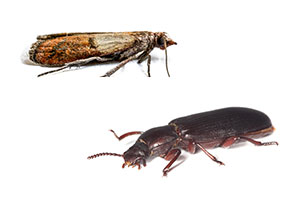
What Types of Pantry Pests Are There?
Some of the most common pantry pests include ants, earwigs, weevils, pillbugs, Indian meal moths, and confused flour beetles. All of these pests prefer different things to infest, including flour, grains, cake mixes, candy, chocolate, nuts, and dried fruit.
When you have a beetle or moth infestation, all four stages of their development (egg, larva, pupa, and adult) may be seen. For the most part, most people don’t notice the infestation until insects have reached the adult stage. No matter the type of pantry pest, it’s important to act quickly when you find them.
Pantry Pest Extermination
If you’ve followed all the preventative tips to prevent pantry pests and still have an infestation, it’s time to call a pantry pest exterminator! The pantry pest extermination team at Active Pest Control can help remove the infestation and protect your property from pantry pests in the future.
What Are Overwintering Pests?
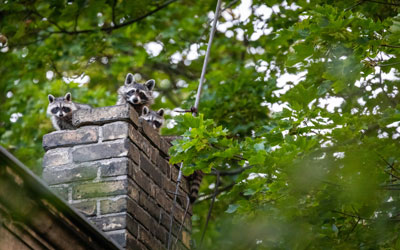 Overwintering pests are insects or other pests that enter homes in the fall for warmth and shelter throughout the colder months of the year. These pests will make themselves at home right in your residence, often in your attic, basement, or crawl space. Some of the most common overwintering pests in Atlanta include mice, rats, squirrels, and bats, along with fall invader pests such as boxelder bugs and stink bugs.
Overwintering pests are insects or other pests that enter homes in the fall for warmth and shelter throughout the colder months of the year. These pests will make themselves at home right in your residence, often in your attic, basement, or crawl space. Some of the most common overwintering pests in Atlanta include mice, rats, squirrels, and bats, along with fall invader pests such as boxelder bugs and stink bugs.
No one wants any pests hunkering down for the winter in their home, which is why it’s so important to learn how to prevent overwintering pests.
Which Pests Overwinter In My House?
The lack of activity in certain areas of your home, such as the attic, makes for the perfect shelter for pests and rodents. The following pests are known to be the most common to overwinter in your attic:
- House mice: These mice prefer secluded areas and will look to nest in your attic using insulation and other stored items.
- Roof rats: Just as their name suggests, roof rats can squeeze their way indoors and up to the attic in your home.
- Bats: Big brown bats will roost in an attic and use it as their cave. Their presence causes a lot of mess to clean up.
- Raccoons: Raccoons are strong climbers and can make their way into your attic to escape dropping temperatures.
- Squirrels: The attic is the perfect place for squirrels to burrow and hide out the colder months of the year.
How to Prevent Overwintering Pests
To prepare for the cold months ahead, there are several things you can do to make your property less attractive to pests looking to stay inside this time of year:
- Trim overhanging tree branches, overgrown bushes, and vines away from your home to limit access to pests.
- Secure your chimney with a chimney cap, and install wire mesh over any vents or roof openings.
- Make sure your trash cans are securely stored in your hard with tight-fitting lids to keep pests out.
- In your attic, organize all items and eliminate any clutter. Use plastic bins instead of cardboard boxes for storage.
- Inspect both inside out outside the attic, and seal any cracks or crevices with caulk or steel wool.
How to Get Rid of Pests in the Attic
Whether you suspect there are bats or squirrels in your attic, it’s important to always enlist the help of a professional pest control company. Active Pest Control is your local leader in wildlife cleanup and exclusion services, and can help protect your home from pests not just in the winter but all year long. Contact us today to learn more!
Is It a Mouse or a Rat?
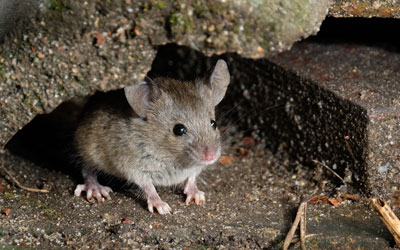 As two of the most common pest rodents, rats and mice cause a lot of trouble for Atlanta GA area homeowners. All types of rodents share a common identifying feature: their ever-growing incisor teeth. They also typically all possess short legs and a long tail, but their similarities stop there. In addition to having different characteristics, these rodents also exhibit different behaviors. A rat infestation can be much different than a mouse infestation, which is one of the reasons why it’s important to know how to tell the difference between these two. Read on for Active Pest Control’ guide to knowing if you are dealing with a mouse or a rat problem.
As two of the most common pest rodents, rats and mice cause a lot of trouble for Atlanta GA area homeowners. All types of rodents share a common identifying feature: their ever-growing incisor teeth. They also typically all possess short legs and a long tail, but their similarities stop there. In addition to having different characteristics, these rodents also exhibit different behaviors. A rat infestation can be much different than a mouse infestation, which is one of the reasons why it’s important to know how to tell the difference between these two. Read on for Active Pest Control’ guide to knowing if you are dealing with a mouse or a rat problem.
All About Mice
Mice are typically significantly smaller than rats and exhibit different behaviors. Here’s how to tell them apart:
- The house mouse is usually just 2–4 inches long.
- Mice have larger ears and a longer tail compared to its body length.
- Mice are often gray or brown in color, with a lighter shade or white color on their bellies.
- Mice droppings have pointed ends and are just 1–2 mm long.
- Most mice feed on fruits, seeds, grains, and occasionally meat.
- They produce 5–10 litters a year with up to 14 mice in each litter.
- Mice forage at dusk and nest in attics, garages, basements, and more.
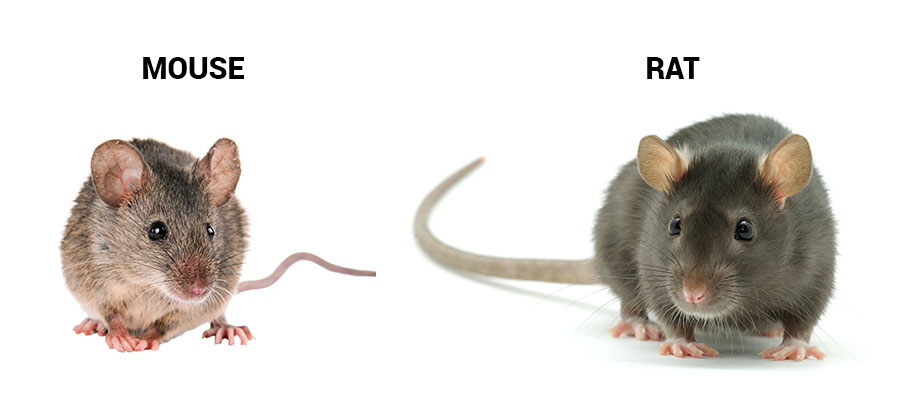
Rat Identification
From the Norway rat to the roof rat, these rodents are known for being larger than their mouse counterparts.
- Rats have thicker bodies and tails that are shorter than the length of their body.
- They possess small hairy ears and larger feet.
- They weigh anywhere from 150 to 300 grams.
- Rat droppings are banana-shaped and much bigger than mice droppings at 10–20 mm long.
- Rats produce 3–6 litters a year with up to 10 pups in each litter.
- Rats are adventurous, omnivorous eaters who will feed on a variety of grains and meats.
- They forage overnight and nest in garages, trees, and basements.
Are Rats More Dangerous Than Mice?
Due to their gnawing and chewing habits, a mouse or rat infestation can be equally dangerous. Rodents are infamous for their ability to carry and spread a number of potentially dangerous diseases. They also can trigger allergies in people. A rodent problem can be a mess to clean up due to the amount of droppings and urine left behind. Lastly, they can cause significant damage to your home. Both mice and rats will chew through insulation, cardboard, wood, and electrical wiring, which can create a fire hazard in your property.
How to Tell If You Have Rats or Mice
It can be easy to tell when you have a rodent problem in your home. However, you likely do not want to get close enough to tell whether you have rats or mice! Your best bet at knowing is to enlist the help of a rodent control expert such as Active Pest Control. We can determine the rodent species that has infested your property and come up with a plan to control them—quick.
Are Rodents More Dangerous During the Pandemic?
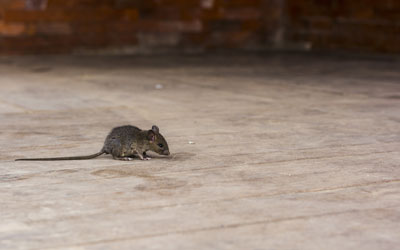 It’s Rodent Awareness Week, and rodent infestations are on the rise. Due to the pandemic, reports of rodent sightings have surged. But why? Back when the coronavirus hit and restaurants began to shutter, rats and mice were suddenly deprived of their food sources. Especially here in Atlanta, this led to more infestations as rodents entered residential homes in search of resources. With the seasons changing as we speak, rodents during the pandemic are even more inclined to be indoors this time of year to stay warm. With infestations on the rise during the pandemic, now is the time to learn how to effectively prevent rodent problems in your property. The team at Active Pest Control is here to help.
It’s Rodent Awareness Week, and rodent infestations are on the rise. Due to the pandemic, reports of rodent sightings have surged. But why? Back when the coronavirus hit and restaurants began to shutter, rats and mice were suddenly deprived of their food sources. Especially here in Atlanta, this led to more infestations as rodents entered residential homes in search of resources. With the seasons changing as we speak, rodents during the pandemic are even more inclined to be indoors this time of year to stay warm. With infestations on the rise during the pandemic, now is the time to learn how to effectively prevent rodent problems in your property. The team at Active Pest Control is here to help.
Rodent Infestations During a Pandemic
Rodents are known to spread a number of dangerous diseases, but what about COVID-19? While rats and mice have been linked to certain coronaviruses, there is no current evidence or research to show that rodents are transmitting the current strain (SARS-CoV-2) to humans.
Here’s what to know about rodents during the pandemic:
- Due to the restaurant shutdowns and lockdowns, there have been several reported cases of rats and mice becoming more bold and rampant in the absence of food sources.
- The surge in rodent activity leads to a bigger risk of infestations and rodent-spread issues.
- While they won’t transmit COVID-19 to you or your family, rodents still can spread other diseases including hantavirus, salmonellosis, and more.
- Once inside your home, rodents can cause damage with their chewing and nesting habits.
Preventing Rodents During COVID-19
The last thing you want to deal with this year is a rat or mouse problem inside your property. To avoid the frustration of an infestation, implement the following rodent prevention tips:
- Store food properly. Securely store food in tight-fitting containers with lids.
- Seal holes around pipes. Use caulk or wire wool to cover up gaps and openings near pipes and other openings.
- Cover vents. Install mesh screens on your vents. Also, consider installing screens on doors and windows.
- Use tight lids on trash cans. Rodents love to rummage in the garbage! If possible, keep your trash cans sealed.
- Protect eaves. Fix any damaged roofing and use wire mesh to seal gaps in your eaves.
Rodent Awareness Week 2020
Here at Active Pest Control, we aim to help educate our customers every Rodent Awareness Week. Now more than ever with rodent problems on the rise, it’s important to learn how to keep rats and mice out of your home. If you need assistance keeping rodents out of your Atlanta GA home, our rodent exterminators are standing by to help. Contact us today to learn more!
What Happens to Termites in the Fall & Winter?
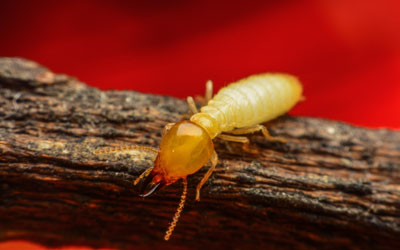 “Termite season” is, unfortunately, all year long here in Atlanta GA. Many assume that termites go dormant in the fall and winter like some other types of pests, but that’s simply not the case. Termites swarm in the spring, but will still dwell in and infest homes throughout the colder months of the year. They are less likely to be seen, especially since they may tunnel further underground to escape dropping temperatures outside. The bottom line is that termites are able to damage your home 24/7, 365 days a year. This makes it all the more important to know how to look for signs of termites in your property, even in the fall and winter months.
“Termite season” is, unfortunately, all year long here in Atlanta GA. Many assume that termites go dormant in the fall and winter like some other types of pests, but that’s simply not the case. Termites swarm in the spring, but will still dwell in and infest homes throughout the colder months of the year. They are less likely to be seen, especially since they may tunnel further underground to escape dropping temperatures outside. The bottom line is that termites are able to damage your home 24/7, 365 days a year. This makes it all the more important to know how to look for signs of termites in your property, even in the fall and winter months.
Termite Life Cycle in the Fall & Winter
Queen termites can lay eggs throughout the year, including in the fall. Their reproduction rate makes it easy for the colony to grow without you even noticing it. The more mature a colony is, the more damage can be made to your home. If you have an infestation festering in your property for more than two years, it is very likely to begin to notice the signs of damage, even in the fall or winter.
We can get cold temperatures in the winter time here in Georgia and Tennessee, and termites may burrow deep underground to protect themselves from the cold air. This is why it’s unlikely to see termites this time of year. However, it’s still important to keep an eye out for the damage they may be causing.
What are the Signs of Termite Activity?
Termites can go unnoticed in your walls for months before any damage begins to appear, which is one of the reasons why they’re so feared! The following damage manifesting in your property could indicate that you likely have a mature termite infestation on your hands:
- Mud tubes
- Discarded swarmer wings
- Termite frass (feces)
- Drywall discoloration
- Loose tiles or buckling floors
- Bubbling or uneven paint on walls
- Holes in drywall
- Crumbling wood
- Hollow-sounding wood
- Sagging sheetrock
Fall Termite Activity in Atlanta
As much as you might wish you didn’t have to worry about termites in the fall and winter, it’s important to stay vigilant about these pests all year long. The termite exterminators at Active Pest Control know how distressing it can be to discover an infestation, which is why we work to prevent them in the first place with our termite treatments. Contact our team today to see how we can keep you termite-free all year long.
Stink Bugs & Boxelder Bugs in Your Atlanta Home
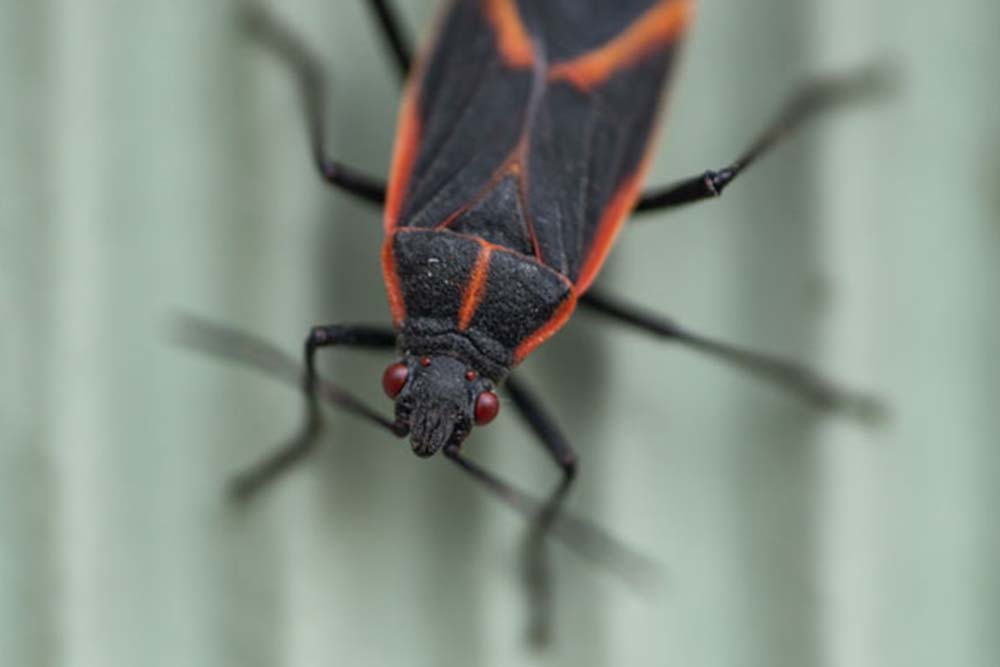 Every fall, there are two bugs in particular that come out in full force in the Atlanta area: boxelder bugs and stink bugs! These fall invaders are inclined to seek out a place to overwinter. They often find shelter on the sides of buildings as the days become shorter. They most often congregate on south- and west-facing walls where they can enjoy more sunlight. This may be a nuisance, but it can become a real problem when the bugs attempt to enter your home. Neither boxelder bugs or stink bugs are dangerous, but they’re still a pain to deal with when they get indoors. Keep reading to learn about these fall invaders and what you can do to keep them out.
Every fall, there are two bugs in particular that come out in full force in the Atlanta area: boxelder bugs and stink bugs! These fall invaders are inclined to seek out a place to overwinter. They often find shelter on the sides of buildings as the days become shorter. They most often congregate on south- and west-facing walls where they can enjoy more sunlight. This may be a nuisance, but it can become a real problem when the bugs attempt to enter your home. Neither boxelder bugs or stink bugs are dangerous, but they’re still a pain to deal with when they get indoors. Keep reading to learn about these fall invaders and what you can do to keep them out.
What Are Boxelder Bugs?
Boxelder bugs have dark brown bodies with unique red markings. They can release a strong odor when threatened. These bugs prefer to feed and live in boxelder, ash, and maple trees. They will also infest trees or plants with plums, grapes, pears, peaches, cherries, apples, and almonds. When the weather gets colder every fall, these bugs will take advantage of any available crack and crevice in your home’s exterior to gain access to the warmth of your home. Both adult stink and boxelder bugs will search for cracks and holes in walls, in window trim and molding, and in your foundation.
Are Stink Bugs Dangerous?
Stink bugs arrived from Asia in the 1980s, and have caused tremendous destruction of local crops. Their backs look like shields, and they can blend easily within foliage. If threatened, these bugs release an odor. There are two main types we see in the states: the brown marmorated stink bug and the green stink bug. Besides being a nuisance, stink bugs are of no harm to humans. They will, however, multiply and feed without stopping, making them a serious environmental threat.
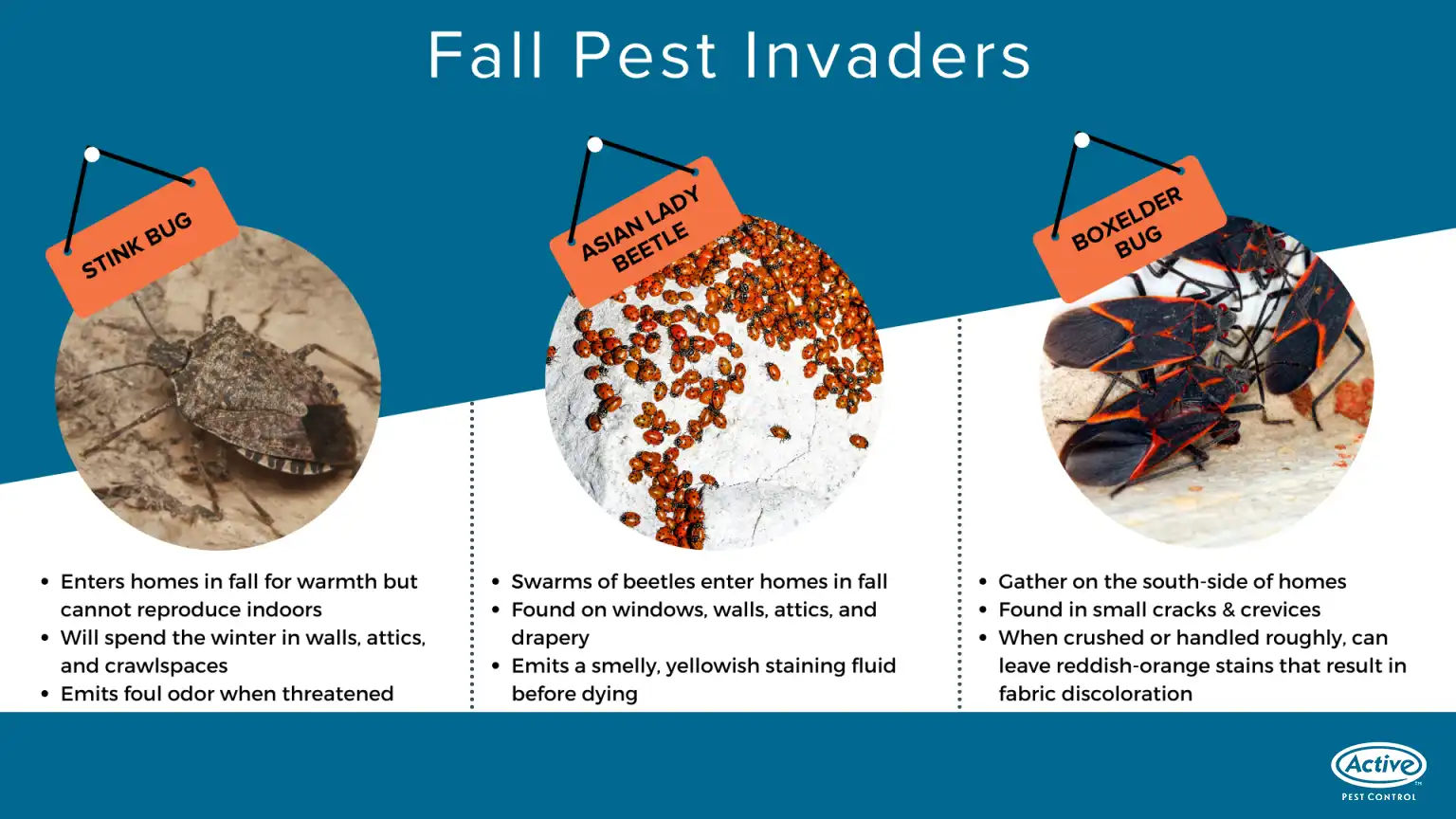
How to Prevent Fall Invader Pests
To keep the bugs on the side of your home out of the interior of your home, exclusion is the key! Our top tips to prevent these fall invaders include:
- Clean out any debris around the foundation of the house.
- Trim back trees and bushes to keep all vegetation away from the perimeter of the home.
- Clean and repair the corners of fences, decorative rocks, old piles of wood, and patio furniture.
- Replace torn screens on windows and doors.
- Check the caulk around the molding of the windows and vents.
- Repair any cracks in stucco and bricks.
- Seal up cracks around roof soffits, windows, siding, and foundation.
- Consider using low-pressure sodium exterior lighting, as UV rays attract the insects.
When to Get an Exterminator for Stink Bugs & Boxelder Bugs
If you have hoards of these fall invaders inside your home, it can be difficult to completely get rid of them. A professional pest control expert such as Active Pest Control can help. Call our team today for more information!
What Are Those Bugs on the Side of Your Home?
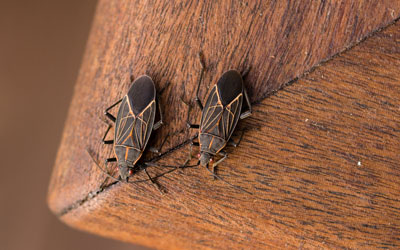 Every year when the weather cools down, there are two insects in particular that are more common than ever. While the stink bug and boxelder bug are primarily nuisance pests, no one wants these odorous bugs invading their property! During the fall in Georgia and Tennessee, these bugs will congregate on the side of your home, particularly on the south or west-facing walls. They may be an eye-sore outside, but the real trouble begins if and when they crawl inside your home. Both of these bugs emit a pungent odor when threatened—and you definitely don’t want your home smelling like them! The team at Active Pest Control has gathered expert information on these bugs—read on to learn how to identify boxelder bugs and stink bugs.
Every year when the weather cools down, there are two insects in particular that are more common than ever. While the stink bug and boxelder bug are primarily nuisance pests, no one wants these odorous bugs invading their property! During the fall in Georgia and Tennessee, these bugs will congregate on the side of your home, particularly on the south or west-facing walls. They may be an eye-sore outside, but the real trouble begins if and when they crawl inside your home. Both of these bugs emit a pungent odor when threatened—and you definitely don’t want your home smelling like them! The team at Active Pest Control has gathered expert information on these bugs—read on to learn how to identify boxelder bugs and stink bugs.
All About Boxelder Bugs & Stink Bugs
Both of these bugs will take advantage of any available crack and crevice in your home’s exterior to gain access to the warmth of your home. Adult stink and boxelder bugs will search for cracks and holes in walls, in window trim and molding, and in your foundation. Both of these pests can multiply and feed at a rapid rate. It’s important to understand how to identify boxelder bugs and stink bugs:
- Boxelder bug: These bugs have dark brown bodies with unique red markings. They emerge out of hibernation in the springtime. True to their name, they live in boxelder trees as well as maple, ash, and fruit trees.
- Stink bug: Their backs look like shields, and they can blend easily within foliage. If threatened, these bugs release an odor. There are two main types we see in the states: the brown marmorated stink bug and the green stink bug.
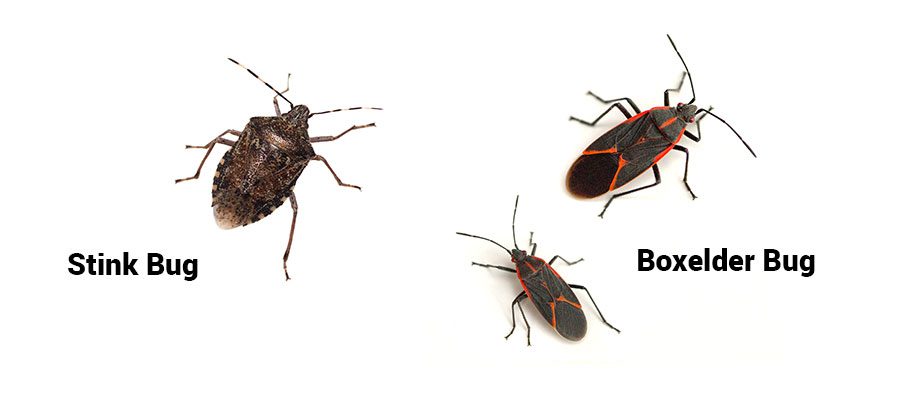
8 Tips to Prevent Stink Bugs & Boxelder Bugs
As with all pests, exclusion is the key. Try out the following tips and tricks to keep these odorous insects outside of your home:
- Clean out any debris around the foundation of the house.
- Trim back trees and bushes to keep all vegetation away from the perimeter of the home.
- Clean and repair the corners of fences, decorative rocks, old piles of wood, and patio furniture.
- Replace torn screens on windows and doors.
- Check the caulk around the molding of the windows and vents.
- Repair any cracks in stucco and bricks.
- Seal up cracks around roof soffits, windows, siding, and foundation.
- Consider using low-pressure sodium exterior lighting, as UV rays attract the insects.
Professional Help for Fall Invaders
The last thing you need to deal with this time of year is a pest infestation. Although stink bugs and boxelder bugs won’t endanger your family, they will be very difficult to get rid of without the help of an exterminator! Contact the team at Active Pest Control today to learn how we can help with those bugs on the side of your home.
The Season of Spiders
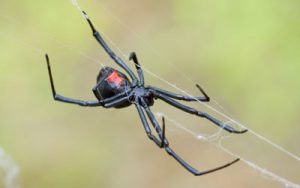 Spiders can be a common pest year-round here in Georgia. Most spiders hatch in the springtime, begin to reproduce in the summer, and are at full force by the time the late summer and early fall months roll around. This is why fall is sometimes called the season of spiders! The good news is that most spiders you will encounter in your home are not going to be of harm to you or your family.
Spiders can be a common pest year-round here in Georgia. Most spiders hatch in the springtime, begin to reproduce in the summer, and are at full force by the time the late summer and early fall months roll around. This is why fall is sometimes called the season of spiders! The good news is that most spiders you will encounter in your home are not going to be of harm to you or your family.
That said, there are a couple of spiders in particular that you should look out for both inside and outside your property at all times. These spiders, the black widow and brown recluse, are known to be more aggressive and may administer a nasty bite when threatened. Keep reading to learn more about spiders in the fall.
 5 Ways to Prevent Fall Spiders
5 Ways to Prevent Fall Spiders
Dangerous or not, no one wants spiders invading their property any time of the year. Thankfully, there are several things you can do to make your property less attractive to these creepy crawlers:
- Maintain a tidy yard and lawn. Overgrown bushes, shrubs, piles of wood, and more can attract spiders to your property and eventually indoors.
- Regularly clean your home. Doing so can prevent insects that spiders like to prey on and eliminate hiding spots for pests.
- Seal cracks and crevices. Inspect the inside and outside of your property for tiny spots that may be inviting spiders in, and seal properly.
- Install or repair screens on doors and windows. Tight-fitting screens are the key to keeping insects, spiders included, out.
- Inspect boxes and used furniture prior to bringing them inside. Egg sacs and adult spiders can be lurking!
Two Dangerous Spiders to Avoid
Most spiders are poisonous in the sense that they contain venom. However, most spiders are not capable of biting humans and transmitting this venom. That said, there are two spiders in particular that are of more danger to you and your family. The black widow is best identified by its unique red hourglass shape on its body. These spiders build sticky, tangled cobwebs in garages, sheds, and near the ground.
Brown recluse spiders, on the other hand, have a darker brown violin-shaped mark and are brown in color. They build looser webs for shelter. They are known to be aggressive when threatened and could administer a bite.
Fall Spiders in Georgia
Although spiders are common year-round, they are more active in the late summer and fall months. If you are dealing with excess spiders in the home, it’s best to contact your local spider exterminators at Active Pest Control.
Top Tips for Pest-Free Outdoor Living
 With summer winding down, you’re likely wanting to spend as much time outdoors as possible. Whether you are hosting a backyard barbecue or reading out on your patio at night, the last thing you want to deal with is a pest problem. Mosquitoes, ticks, flies, lawn pests, and wasps are just a few of the many pests that can become quite a nuisance. At Active Pest Control, we know you want to enjoy your time spent in your outdoor living spaces to be pest-free*, which is why we’re here to provide you with our top tips for pest-free* outdoor living in your Atlanta area home.
With summer winding down, you’re likely wanting to spend as much time outdoors as possible. Whether you are hosting a backyard barbecue or reading out on your patio at night, the last thing you want to deal with is a pest problem. Mosquitoes, ticks, flies, lawn pests, and wasps are just a few of the many pests that can become quite a nuisance. At Active Pest Control, we know you want to enjoy your time spent in your outdoor living spaces to be pest-free*, which is why we’re here to provide you with our top tips for pest-free* outdoor living in your Atlanta area home.
Common Pests in Your Yard
The time of year that provides nice enough weather for you to be outdoors is also the time of year when pests are most active! Whether you have a garden in your backyard or couches and tables on your deck, you will likely encounter some of the following pests:
How to Prevent Pests in Your Outdoor Living Space
To keep pests away when you’re in your yard, there are several things you can do. The best ways to keep pests away in your outdoor space are as follows.
- Get rid of standing water. Mosquitoes only need a half inch of standing water to breed.
- Keep your lawn and shrubs trimmed. Overgrown grass or vegetation provides mosquitoes and ticks with shelter.
- Know how to look for ant hills. Even a tiny mound can contain thousands of ants inside.
- Check wood structures. Termites and carpenter bees will damage your wooden decks or porches.
- Use an insect repellent. Insect repellent containing DEET will help repel mosquitoes and ticks.
- Clean your patio or space regularly. Crumbs or spilled liquids will attract ants and other insects.
Year-Long Pest-Free Living
Pests are just a fact of life outside. However, you don’t have to let them ruin your time spent in your own backyard! For help implementing pest-free* outdoor living tips, the experts at Active Pest Control can help. Contact our residential exterminators to learn more.

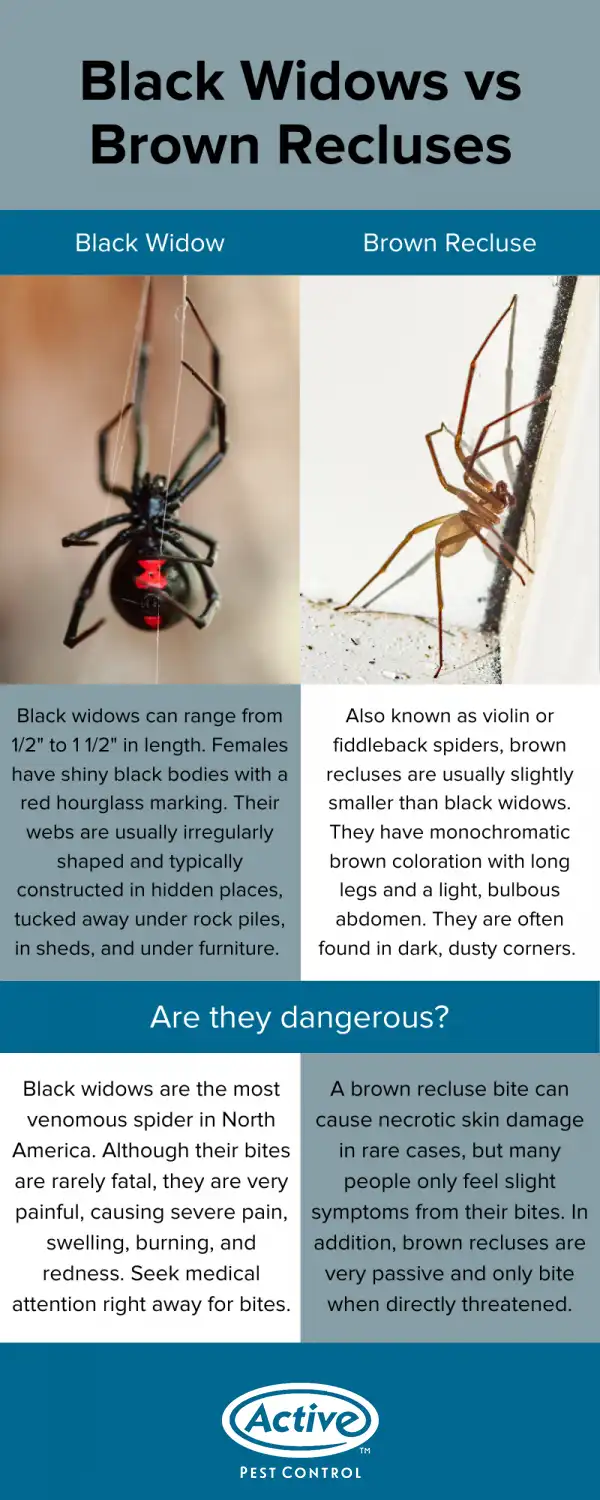 5 Ways to Prevent Fall Spiders
5 Ways to Prevent Fall Spiders